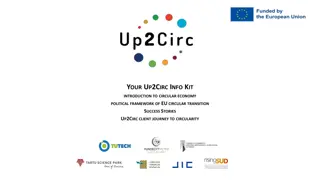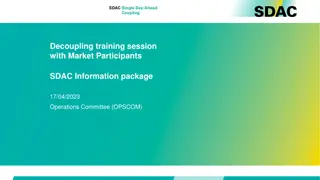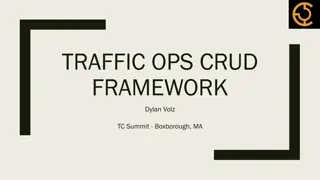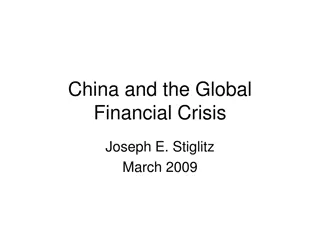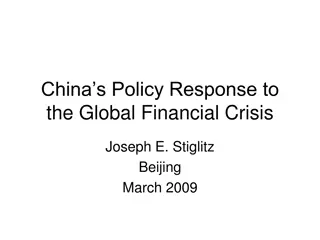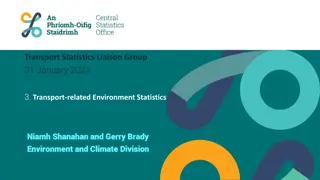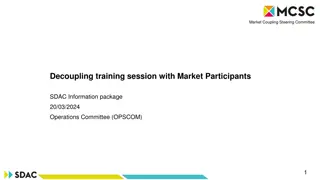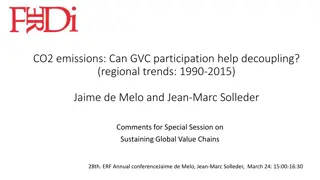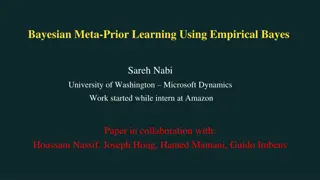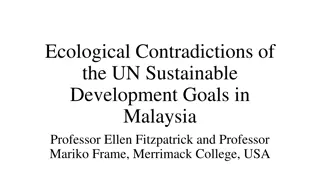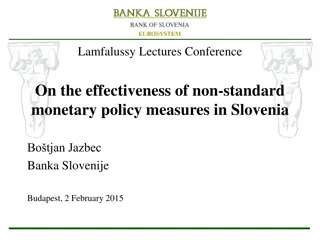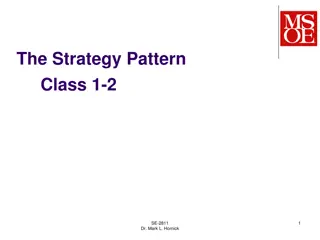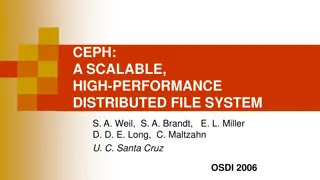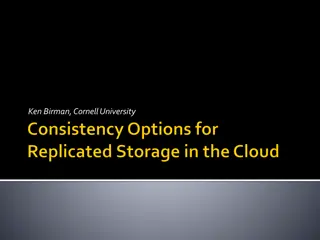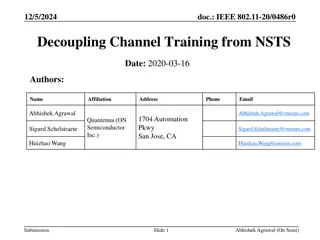Accelerating Towards a Circular Economy Future
The circular economy presents a vital solution to tackle climate change by focusing on regenerative growth, reducing resource consumption footprint, and enhancing material use efficiency. The EU's Circular Economy Action Plan aims to usher in a sustainable future through decoupling economic growth f
2 views • 19 slides
Market Decoupling Training Session with SDAC Information Package
Decoupling training session organized for market participants to prepare for handling a full decoupling scenario in the SDAC market. The session includes background information, goals, scenario simulation, operational processes, coordination, evaluation, and fallback solutions. Date and timeslot set
2 views • 10 slides
Understanding Dependency Injection Principles in Software Development
Explore the concept of Dependency Injection, its importance in decoupling code modules, SOLID principles, and why it's crucial for maintainability, flexibility, and testability in software development.
0 views • 23 slides
Framework Overview & Recent Changes
This content outlines the traffic operations CRUD framework created by Dylan Volz for the TC Summit in Boxborough, MA. It covers routing basics, middleware, handler types, generic handlers, and recent/future changes in the framework's development, emphasizing decoupling and flexibility for improved
0 views • 7 slides
The Global Financial Crisis: Impact on China and the Global Economy
The global financial crisis described by Joseph E. Stiglitz in March 2009 highlights the interconnectedness of economies and the challenges faced by various countries. The crisis has led to a deep and prolonged downturn affecting both developed and developing nations, debunking the myth of decouplin
0 views • 33 slides
Global Financial Crisis Response: Challenges and Solutions
Amidst a deep and prolonged global downturn, exacerbated by the myth of decoupling, countries face economic strains with high unemployment, reduced consumption, and lower investment. The need for a coordinated global response is crucial to address the challenges and stimulate recovery through effect
1 views • 26 slides
Analysis of Florida Keys Canal Remediation Diel Results
The analysis focuses on the diel results of a canal remediation project in the Florida Keys as of 11/01/2016. It includes measurements of %DO saturation above 42% and the average %DO saturation over a full day, with data points on control and remediated surfaces. Significant improvements are observe
0 views • 18 slides
Zorua: A Holistic Resource Virtualization in GPUs Approach
This paper presents Zorua, a holistic resource virtualization framework for GPUs that aims to reduce the dependence on programmer-specific resource usage, enhance resource efficiency in optimized code, and improve programming ease and performance portability. It addresses key issues such as static a
0 views • 43 slides
Overview of CSO Environment Statistics Liaison Group Presentation on Transport-related Environment Statistics
The presentation outlines statistical releases relevant for transport statistics by CSO Environment and Climate division. It covers fuel excise clearances, fuel oil movements, environmental accounts, and more. The data is sourced from the Revenue Commissioners and offers insights into greenhouse gas
0 views • 15 slides
Market Coupling Steering Committee Decoupling Training Session
The Market Coupling Steering Committee is organizing a training session on full decoupling of the Single Day-Ahead Coupling (SDAC) system. The session will simulate scenarios, operational processes, fallback solutions, coordination, and evaluation methods. Participants will engage in a detailed oper
0 views • 10 slides
Decoupling Training Session with Market Participants: SDAC Information Package
This training session focuses on preparing all operational parties involved in the SDAC market for a potential day-ahead market decoupling incident. Organized to simulate a full decoupling scenario, the session aims to ensure that all participants are well-equipped to handle such situations effectiv
0 views • 11 slides
CO2 Emissions and Global Value Chains: Trends in Decoupling and Regional Impacts
The discussion focuses on the relationship between CO2 emissions and Global Value Chains (GVCs) from 1990 to 2015, exploring how GVC participation can aid in decoupling. It covers the environmental implications of GVCs, such as the effects on CO2 footprints, trade patterns, and emission intensities
0 views • 19 slides
Congestion Control for High Bandwidth-Delay Product Networks
This presentation discusses the challenges faced by TCP in high bandwidth-delay product networks, highlighting issues such as oscillations and instability. It explores solutions like adjusting aggressiveness based on feedback delay, decoupling efficiency and fairness control, and introduces XCP as a
0 views • 23 slides
Decoupling Learning Rates Using Empirical Bayes: Optimization Strategy
Decoupling learning rates through an Empirical Bayes approach to optimize model convergence: prioritizing first-order features over second-order features improves convergence speed and efficiency. A detailed study on the impact of observation rates on different feature orders and the benefits of seq
0 views • 25 slides
Bayesian Meta-Prior Learning Using Empirical Bayes: A Framework for Sequential Decision Making Under Uncertainty
Explore the innovative framework proposed by Sareh Nabi at the University of Washington for Bayesian meta-prior learning using empirical Bayes. The framework aims to optimize ad layout and classification problems efficiently by decoupling learning rates of model parameters. Learn about the Multi-Arm
0 views • 27 slides
Ecological Contradictions of UN Sustainable Development Goals in Malaysia
This study conducted by Professors Ellen Fitzpatrick and Mariko Frame from Merrimack College, USA, examines the potential conflicts between economic objectives and environmental sustainability goals within the UN Sustainable Development Goals framework, using Malaysia as a case study. It delves into
0 views • 15 slides
Analyzing Utility Push for Increased Customer Charges
This content delves into the utility industry's trend of pushing for higher customer charges and its implications. It questions the use of high customer charges as a substitute for revenue decoupling, examines their impact on energy efficiency policies, and debates their alignment with competitive p
0 views • 11 slides
Challenges and Solutions in Implementing Non-Standard Monetary Policies in Slovenia
The decoupling of real and financial cycles in Slovenia, attributed to a balance-sheet recession and unsustainable debt-financed growth, poses challenges for monetary policy effectiveness. Credit decline persists despite economic growth, hindered by risk-averse banks and limited market for alternati
0 views • 14 slides
Understanding the Strategy Design Pattern
The Strategy Design Pattern is a behavioral pattern that helps in encapsulating behaviors and varying them as attributes to avoid implementation inheritance and class explosions. By decoupling strategies from the main functionality, it allows for flexibility and ease in changing algorithms at runtim
0 views • 21 slides
Updates and Changes in HAR Review 2023
The HAR Review 2023 outlines updates regarding remuneration, changes in the 15 min MTU, and modifications in LTFBA rules. It addresses issues like decoupling remuneration, liability types, credit limits, auction specifications, and more. These adjustments aim to enhance the efficiency and effectiven
0 views • 7 slides
Decoupling Training Session with Market Participants SDAC Information Package
This training session aims to prepare operational parties and market participants for handling a day-ahead market decoupling incident in real operations and real-life conditions. The scenario includes full decoupling of SDAC, focusing on evaluating, coordinating, and reporting the process. The sessi
0 views • 11 slides
Overview of Ceph Distributed File System
Ceph is a scalable, high-performance distributed file system designed for excellent performance, reliability, and scalability in very large systems. It employs innovative strategies like distributed dynamic metadata management, pseudo-random data distribution, and decoupling data and metadata tasks
0 views • 42 slides
Insights into Modern Cloud Computing Trends
Explore key insights shared by industry experts including Ken Birman, Randy Shoup, and Werner Vogels on topics such as consistency, availability, scalability, and synchronization in modern cloud computing. Learn about the challenges and strategies related to maintaining reliability, stability, and s
0 views • 38 slides
Decoupling Channel Training Length for EHT Evaluation in IEEE 802.11 - 20/0486r0
Evaluation of decoupling channel training length from the number of streams for EHT in IEEE 802.11. The impact of noise on channel estimation error in data symbol detection is assessed, highlighting techniques for noise improvement. Further insights into 11ax training sequences are provided, along w
0 views • 13 slides
